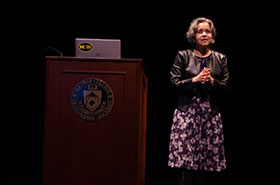In a talk titled Math to Maps to Moms, Dr. Marie Lynn Miranda gave the 17th Wege Foundation Lecture at Aquinas College April 18. The dean of the University of Michigan’s School of Natural Resources & Environment is a leading authority on how environmental toxins are poisoning our children’s health—especially children whose families live in poverty.
Babies are not small people, Dr. Miranda explained, which puts them at the highest risk for ingesting toxins like lead. They crawl on the ground where cleaning chemicals are concentrated and put everything in their mouths. Even worse, because their metabolisms operate faster than in adults, babies are more apt to suffer brain damage from lead than their parents. Faster metabolisms mean babies take in more food and water per pound and breathe more air than adults making them more vulnerable to environmental toxins including lead.
Visible symptoms of lead poisoning include colic and wrist drop. But the worst consequences can’t be seen. Lead damages babies’ and children’s central nervous systems, hearing ability, and attention spans. Dr. Miranda’s research is directed at locating neighborhoods with the highest number of lead-poisoned children – almost always in impoverished parts of town.
She and her team find these children from blood samples that have been tested for lead. In those with elevated levels, Dr. Miranda found clear evidence of developmental deficits attributed to the lead in their blood stream.
But Dr. Miranda, who came to Michigan from Duke University, sees hope for mitigating the neurological damages of lead. And she starts with a colorful backpack full of new books and a library card for each child. Lab studies on rats have shown their lead-poisoned brains start functioning better when the rats are put in cages full of bright toys they can manipulate. For the children hurt by lead poisoning, Dr. Miranda sees the stimulation of books and mentors reading to them as the best hope to improve their brain function. Passionate about her cause, Dr. Miranda told the Aquinas audience, “These children deserve every opportunity all our children do.”
